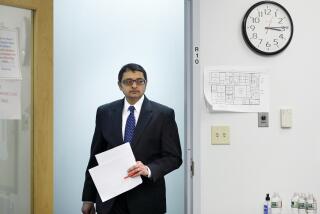Federal Anonymous AIDS Study Raises Ethics Issues
- Share via
WASHINGTON — Federal health officials, after months of soul searching over complex ethical questions, have begun testing anonymous blood samples from hospital patients across the nation in an effort to obtain a more accurate picture of the magnitude of the AIDS infection, The Times has learned.
The study will use blood samples routinely collected from patients admitted to hospitals for non-AIDS-related reasons. The specimens, ordinarily discarded, will be labeled by age, race and sex only, with no identification of individuals and no way of contacting them later after the results are known.
Officials at the federal Centers for Disease Control said that they wrestled with a “philosophical conflict” over whether it was appropriate to test individuals without their knowledge or a way to inform them later of test results. They said that they were troubled by the apparent conflict between Public Health Service policy--which is to encourage those at risk to voluntarily undergo the test--and the study, which eliminates any mechanism for telling individuals what those test results are.
But, eventually, they decided that it was the only way to gather the needed information.
“We have no real way of knowing the prevalence of infection without something like this,” said Dr. Walter Dowdle, CDC’s AIDS director.
Until now, figures cited to describe the extent of AIDS infection in this country--1 million to 2 million Americans--is a projection based on known AIDS cases, the number of homosexuals and intravenous drug users--the groups pri marily afflicted with AIDS--and AIDS infection among those who have been treated at clinics for drug abuse and sexually transmitted diseases.
Dr. Timothy Dondero, chief of the surveillance and evaluation branch of CDC’s AIDS program, said that the testing would be done for “statistical purposes only, to get a sense of how much infection there is in the population.”
Further, Dondero said, “knowing how much infection there is in some communities will enable us to know where intervention programs are necessary.”
Since AIDS often takes four or five years to develop after infection, Dondero said, “if you only count AIDS cases, that will only tell you what areas had a problem five years ago. It won’t tell you what happens over time. Through this sample method, we can keep track of that. There is an assumption that the amount of infection is increasing over time, but we don’t have any confirmation.”
Dondero said that, if they were required to obtain informed consent from each patient who participated in the study, a “volunteer” pool would be created, such as now exists with blood donors and military recruits, the only other large groups currently being tested.
Eliminates Bias
This, he said, would defeat the purpose of the study by introducing “bias” into the results because some may refuse to grant such consent. Testing random samples, however, would not produce the same bias, he said.
Medical ethicists and researchers were mixed in their reactions to the study, which began in December with five hospitals and is expected to expand in the coming months.
“It’s a difficult issue, and I can see why CDC would struggle with it,” said Dr. Bernard Lo, assistant professor of medicine and medical ethics at UC San Francisco. “It’s a potential conflict between what’s good for society--clearly, this needs to be done--and the rights of the individual. The people who get the benefits aren’t the same ones who bear the burden.”
He added: “Even though the numbers are small, there may be third parties harmed--the sexual partner, for example, of somebody who doesn’t think he is infected and wouldn’t voluntarily take the test. Or a woman of child-bearing age who needs to know she shouldn’t get pregnant.”
‘Ethically Appropriate’
Carol Levine, co-director of the AIDS project for the Hastings Center, a medical ethics research and educational institution in Hastings, N.Y., said that “we tried to foresee this particular problem and felt it was ethically appropriate to do a study to determine (the magnitude of infection) if there were never any identifiers with the samples.”
She added: “The value of having the information is quite large and the risk to the individual is non-existent, as long as there is no way to link the sample to the individual and have the information divulged.”
Dondero said that 300 samples per month from each hospital would be tested, costing about $30 each, and it is expected to be six months to a year “before we have any meaningful data.”
But Dr. Robert T. Schooley, an AIDS researcher at Massachusetts General Hospital, objected to CDC’s approach, saying: “You’re generating information about individual people--whether you know who they are or not--which may be very important for those people to have.”
California Role Unclear
It was not clear whether California state law, which prohibits the AIDS test without an individual’s explicit written permission, would prevent the CDC from conducting the study in California.
Hospitals, which must agree to participate and will not be publicly identified, were selected for their location in “representative” geographic areas, Dondero said. They must serve all age and economic groups and have a “sufficient patient volume . . . with things not likely to be related to (AIDS) infection,” Dondero said.
AIDS, or acquired immune deficiency syndrome, is caused by a virus that destroys the body’s immune system, leaving it powerless against certain cancers and otherwise rare infections. It is commonly transmitted through anal and vaginal sexual intercourse, through the sharing of unsterilized hypodermic needles, and by mother to child during pregnancy. As of Monday, it had struck a total of 29,137 Americans, of whom 16,481 had died.
More to Read
Sign up for Essential California
The most important California stories and recommendations in your inbox every morning.
You may occasionally receive promotional content from the Los Angeles Times.













